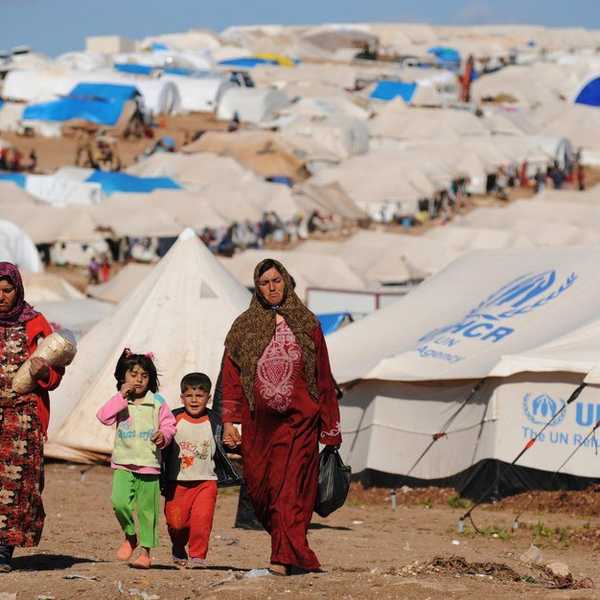Back in October, I had the privilege of attending the Holocaust Museum in Washington, D.C.
As I made my way through the exhibits flanked by a crowd of thoughtful, solemn faces, there were countless aspects of the museum that stood out to me, but there was one exhibit that caught my particular attention: the section that dealt with German refugees in the early 20th century.
I stumbled upon a plaque that detailed the United States' callous treatment of Jewish refugees, among them Anne Frank and her family, fleeing from the Nazi regime in the 1930s and 40s. I felt a sinking feeling in my stomach as I read about the thousands of men, women, and children who were turned away by the United States, only to be sent to deadly concentration camps across Europe. I found myself shocked and disgusted by my country's lack of action against the atrocities committed by the German government.
How, I thought, could America have been so blind?
But hindsight, of course, is 20/20. As I stood there and continued to read, I came to the realization that this all sounded eerily familiar. A variety of headlines I had seen in newspapers, magazines, and websites over the past few months suddenly popped into my mind, all of which concerned an issue I didn't know much about - the Syrian refugee crisis.
In the past few months, I realized, I had been hearing a lot about the crisis in Syria and the crimes against humanity committed by Assad.
There had been talks of inadequate vetting procedures and the potential of Syrian refugees being in league with ISIS, as well as the insistence by then-Republican nominee Donald Trump that a travel ban against Muslims must be instituted to protect against terrorism. Regardless of the constant media coverage, I hadn't really looked into the issue enough to make a sound judgment: all I knew that day was that the eery similarities between present-day America and the America of the early 20th century left me feeling uneasy.
Now Donald Trump is president and the travel ban that had once been nothing but a far-fetched pipe dream has become all too real. When I heard about Trump's executive order banning immigrants and refugees from seven predominately Muslim countries, including Syria, I thought back to that day at the Holocaust Museum and how unsettled I had felt. I decided it was time for me to educate myself on the issue.
What I discovered left me in awe.
First and foremost, I was shocked by the dismal state of affairs in Syria. A bloody civil war started by rebels attempting to overthrow the tyrannical Assad regime had left millions displaced and in need of a place to go.
Startlingly, half of those affected were children. Despite the desperate need for refugees to be resettled, the United States government was going to great lengths to keep them from entering the US, citing our national security as the justification.
This misguided reaction to the refugee crisis was and still is putting thousands of innocent Syrian lives at risk.
Another thing that caught my attention was the fact that there were striking similarities between America's conduct in the 1940s and its conduct today. During one of Franklin Delano Roosevelt's famous fireside chats in May 1940, he said of what he suspected to be German spies: "Today's threat to our national security is not a matter of military weapons alone. We know of new methods of attack. The Trojan Horse...spies, saboteurs, and traitors."
It turns out these "spies" Roosevelt was referring to were, in fact, Jewish refugees.
Sound familiar?
Evidently, the Trump administration's penchant for xenophobia is nothing new. In fact, it has been a recurring theme throughout history. Despite memorials, days of remembrance, and constant reminders to never allow history to repeat itself, repeat itself it does.
Today we are justifying the refusal to accept Syrian refugees with largely unfounded concerns that Syrian men, women, and children fleeing from the tyrannical Assad regime might have ties to ISIS. In the same way, Roosevelt condemned Jewish refugees as "saboteurs," we are labeling Syrian refugees as "terrorists."
Despite the fact that refugees are heavily vetted and monitored prior to their entrance into the country, many are hiding behind this excuse in order to legitimize xenophobia.
We as a nation simply haven't learned from our past mistakes. Fear of the other has been a driving force in both intentional and implicit forms of discrimination throughout history, and often people refuse to acknowledge it when it is right in front of their face. In light of this fact, the best way to combat xenophobia is to raise awareness of it.
There are numerous things you can do to make your voice heard. In addition to protesting and writing to your congressman, you can donate to humanitarian organizations such as the International Red Cross, volunteer with nonprofits such as Doctors Without Borders, and make refugees feel welcome by reaching out to refugee communities in your area through letters, cards, and care packages. The American people are far from powerless to combat the actions of the Trump administration.
Author Mark Twain once said, "History rhymes." This time, however, it won't —not if the American people have anything to say about it.





















